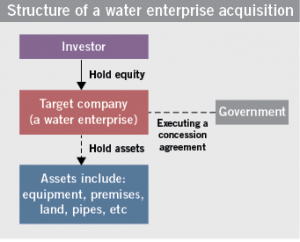InChina Business Law Journal’s April 2011 issue, our Correspondents article entitled “Legal Issues Relating to Water Industry Concessions” explored the securing of concessions by water enterprises (mainly by urban water supply and sewage treatment enterprises) through the invitation and submission of bids and the execution of concession agreements. In contrast to negotiating and executing concession agreements with governments to secure concessions, an increasing number of investors are favouring the acquisition of water enterprises that already have concession rights, permitting them to more effectively enter or expand their water business.

Partner
Concord & Partners
Beijing
Why sell?
However, while pursuing efficiency, it is also necessary to be aware of the legal risks involved in acquisition transactions. Why does the seller wish to sell equity? This is a question common to all acquisition transactions, but one that water enterprises particularly need to pay attention to, the reason being: a concession is generally secured after a complex bidding procedure and long and arduous negotiations with the government, and under normal operating conditions a water enterprise’s returns are steady – so why does the seller want to pull, in whole or in part, out of a concession that it gained only with great effort?
Additionally, one of the entities involved in a concession is a government, and notwithstanding our viewing a concession agreement as a civil agreement and the government as a civil entity in the agreement, not an administrative entity, due to the special status of governments, the reason why a seller wishes to sell equity remains complex and important.
Legal due diligence
Regardless of whether the seller will give its reasons for selling of its own accord or as the result of a request by the investor, it is nevertheless necessary for the investor to ascertain, through due diligence, the reasons for selling, so as to avoid losses. Legal due diligence that focuses on the business features of a water enterprise may discover the following reasons for selling:
- Water charges: difficulty in collecting water charges is one of the problem issues faced by many water enterprises. Regardless of whether it is a tap water production enterprise collecting water charges from end users or a sewage treatment enterprise collecting sewage treatment charges from a government, it may face the problem of being unable to collect the water charges on time and in full. Due diligence can show the amount of the water charges outstanding, the payment interval, the reasons, etc., thus allowing the investor to determine the latent collection risks.
- Assets: a water enterprise’s assets mainly consist of equipment, premises, land and pipes. Through legal due diligence, it is possible to ascertain whether title to these important assets is free and clear, whether they are the subject of a dispute, and whether they have quality problems. Particularly for the pipes, since they are buried underground, in a legal due diligence it is not possible to carry out an on-the-spot check. However, the lawyer can, by reviewing the construction contracts, project acceptance documentation, interviews and other such means, obtain information relating to title to, and age of, the pipes, state of the pipe material and leakage rate, and thereby assist the investor in determining where such issues as poor pipe quality and high leakage rate exist. The operational and maintenance costs that these problems engender may constitute the reason for selling.
- Attention to existing breaches of contract: through legal due diligence it is possible to find existing instances of breaches of the concession agreement, e.g. failure to carry out construction of the pipes and/or premises on the schedule confirmed in the bid invitation and submission documents, or failure to close the standby well in accordance with the specified conditions. Such breaches may arise from a problem attributable to the government (e.g. difficulties in closing the standby well) or a problem attributable to the target enterprise (e.g. insufficient construction funds). In practice, such breaches of contract could give rise to difficulties and risks to continued operations, and will often constitute a reason for selling.
Seeking solutions
One of the parties to a concession agreement is a government. Accordingly, regardless of the reason for selling, if it is found that there is a change in the equity of the enterprise exploiting the concession, it is imperative to talk with the government that granted the concession. If the reason for selling arose as a result of a problem attributable to the government, it is even more important to consult with the government.
If a plan to collect and pay the outstanding sewage treatment charges, close the standby well, etc., is to be implemented, it may be confirmed by executing a supplementary agreement to the concession agreement.

If there is no breach of the concession agreement involved, pertinent conditions precedent may be inserted into, and liability for breach of contract expressly provided for in, the acquisition agreement. If pipe quality risks and construction schedule risks exist, the seller may be required to give an undertaking, and the payment of the acquisition moneys made contingent on the seller’s undertaking.
Liu Jinghua is a partner at Concord & Partners in Beijing
北京市朝阳区麦子店街37号盛福大厦1930室
Suite 1930, Beijing Sunflower Tower, 37
Maizidian Street, Chaoyang District, Beijing
邮编 Postal code: 100026
电话 Tel: +86 10 85276468
传真 Fax: +86 10 85275038
电子信箱 E-mail:
liujinghua@concord-lawyers.com
www.concord-lawyers.com






















